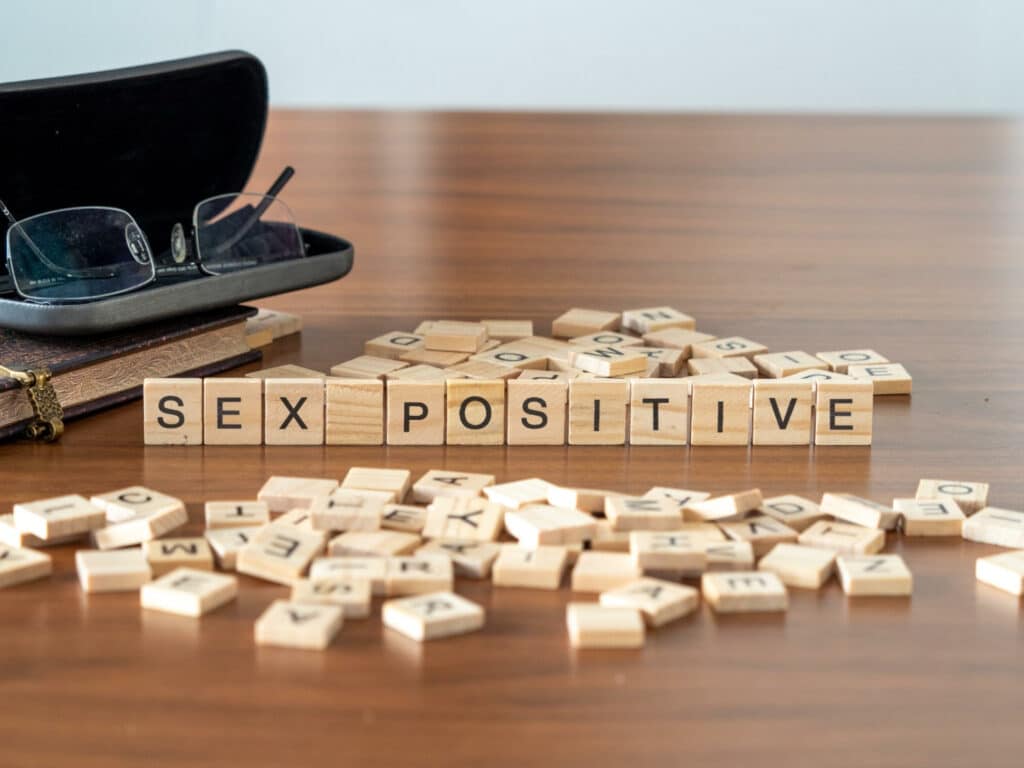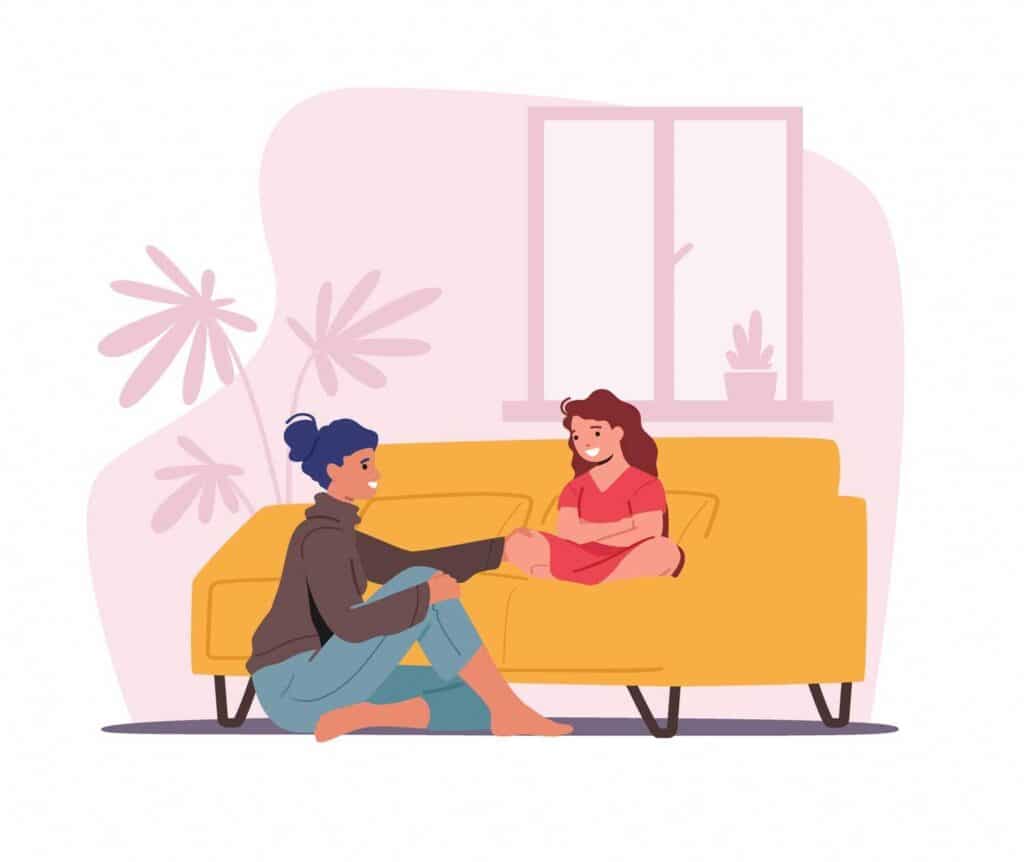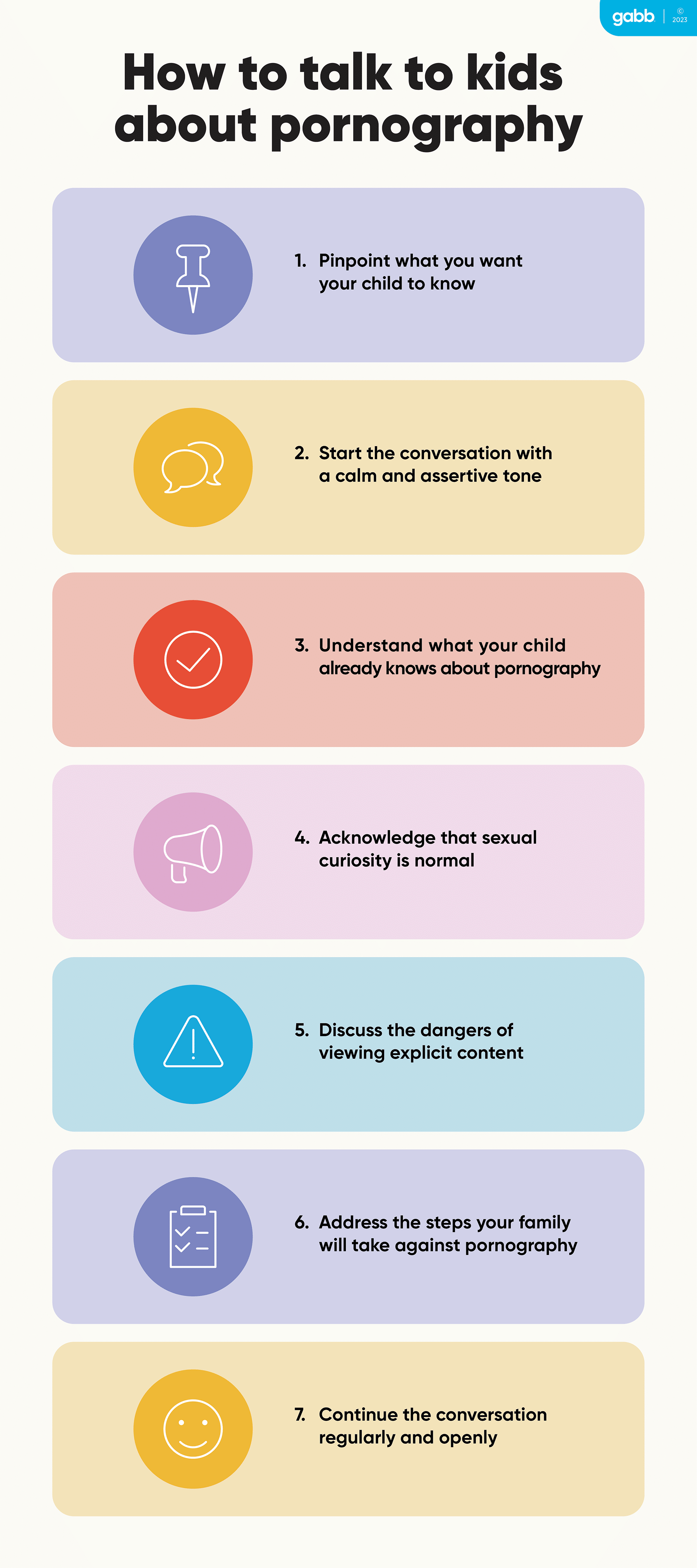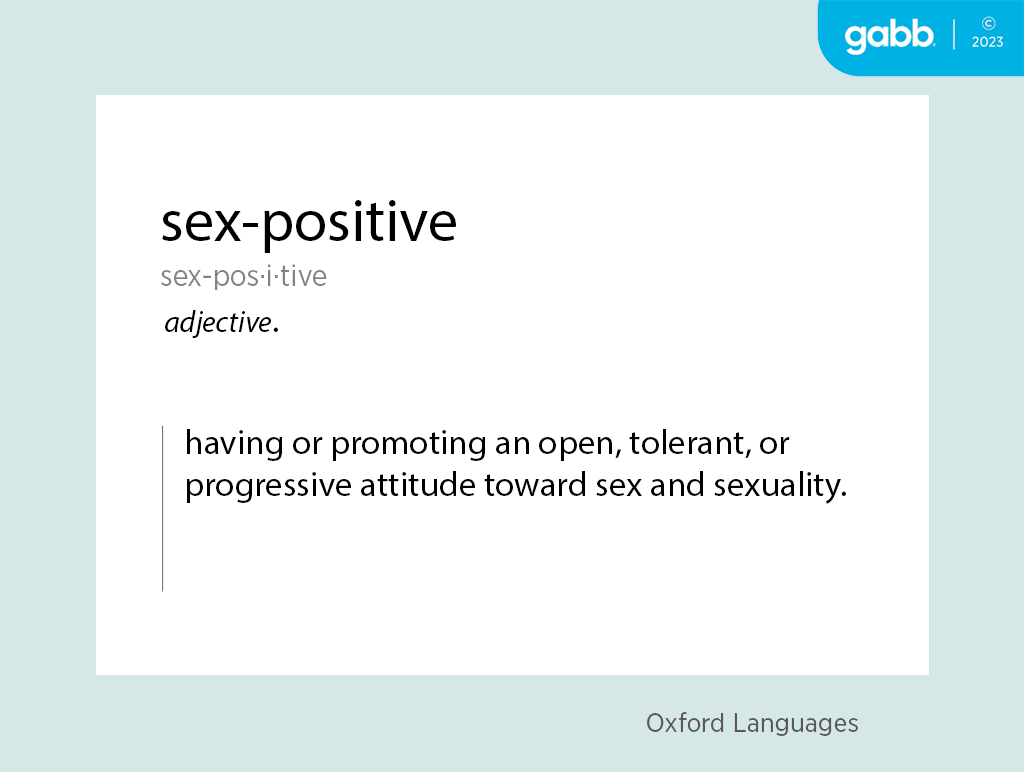The thought of having “the talk” with our kids can make even the most confident of us feel trepidatious. Instead, thinking about introducing the concept of sex to kids as a series of ongoing conversations can create healthy opportunities to frame intimacy in positive ways.
An important part of these conversations includes a discussion about pornography.
Studies show it’s almost inevitable that children will be exposed to pornographic content, and these crucial conversations will prepare them for when they encounter explicit material.
Parents may want to shield their children from explicit content by not talking about it, but this leaves children unprepared if they are exposed.
Parents can control the narrative with ongoing, shame-free discussions that start early and evolve as children grow.
While talking early is important, it’s never too late to start talking with older children and teens about pornography.
54% of teens said they were exposed to pornography at age 13 or younger. [1]
—Common Sense Media
The Prevalence of Pornography
73% of teens report encountering pornography. [1] Kids are often exposed to pornography through a friend, on social media, or accidentally.
Parental controls on devices are important, but are not always reliable and sometimes inappropriate content can get through filters. Kids can also be exposed on devices outside of your household. The best course of action is to start talking to kids early, openly, and often.
In 2022, Pornhub, a pornographic video-streaming website, ranked fourth as the most visited website in the U.S., right behind Google, YouTube, and Facebook. [2] Pornography is prevalent in our society, and there are damaging consequences when children view it.
We can set up defenses by arming our children with the necessary tools and skills to deal with the dangers of exposure to inappropriate content.

Real Sex vs. Pornography
Kids often turn to pornography when they have questions about sex. Curiosity is completely normal and even healthy, but children need to know that the answers to their questions will be better answered by a loving parent or family member.
Kids need to know that pornography is not real sex—it’s a performance.
Real life sex looks nothing like it does in pornography. Real sexual intimacy occurs between consenting people who choose to share a very private and personal moment, often as a way to express love.
Sometimes people look at pornography because they want to learn about sex, but that’s like watching ‘The Fast and the Furious’ to learn how to drive. [4]
In contrast, pornography is a performance involving contracted actors whose whole purpose is to sell the content produced. Sex in pornography is not only an exaggerated show, it is also often misogynistic, portraying women as something to be conquered and subdued. [3]
Getting Comfortable with Crucial Conversations
Crucial conversations are only awkward when we think they are. Labeling them as such will only build up the negative feelings around it. A simple change in our mindset can circumvent the stigma around talks about intimacy.
Instead of dreading the discussions and focusing on the unpleasantness, we can think of these moments as opportunities to educate our child on a topic that is critical to their wellbeing now and in the future.
Choose a casual time
Important talks don’t need to be formal. [9] Make it casual by chatting in the car, on a walk, or even when getting ready for bed. The informality will not only normalize the topic, it will also minimize eye contact which can reduce embarrassment.
Make it an ongoing conversation
As parents we can normalize sex education and discussions about pornography by speaking openly and often about it. [10] When it becomes an expected topic of discussion, kids are more transparent and may be more willing to ask questions.
Sex Positive

When parents make a conscious effort to be sex-positive, kids are rewarded with less shame or trauma concerning sex. Being sex-positive encourages children to openly ask questions, which allows consent and respect to be at the forefront of their minds.
This does not mean we cannot explain the beliefs or boundaries we prescribe surrounding sexual intimacy, simply that we encourage their questions and promote ongoing, healthy conversations about sex.
Implications of sex-negative messages
Sex-negative messages have been shown to impact people’s feelings of self-worth and their mental health. [1] We can discuss the positives of healthy sexuality by emphasizing consent and respect in relationships.
By becoming a safe and nonjudgmental ally for our children, we can encourage open dialogue and self-compassion. Parents and children will mutually benefit from a healthy relationship.

The Dangers of Pornography for Kids
Research shows that pornography consumption by young people is detrimental to their well-being. The American College of Pediatricians reports that children who view explicit content are more likely to experience anxiety, depression, anger, and fear. Kids who observe violent sexual acts are likely to practice such acts on peers or younger siblings. [5]
Beware of secrets
Since pornography use by minors is usually frowned upon by parents, kids may feel ashamed and hide their activities if they view pornography. This can lead to kids becoming masters of deception to avoid disappointing their parents.
Research by McAfee [6] found that 59% of kids proactively hide their online lives from parents. Tactics include deleting the browser history, hiding or deleting messages, using apps that hide prohibited apps, browsing in incognito mode, closing or minimizing the browser when parents walk in, or lying about their online activities. Keeping secrets has been linked to health problems, anxiety, depression, and even less satisfaction in sexual relationships. [7]
Pornography can be addicting
Our brains are complex, but follow simple principles. The more we do something, the more we learn to love it. Some studies suggest that pornography hijacks the brain by increasing the levels of dopamine, the neurotransmitter that plays a role in pleasure, leading the brain to crave pornography more and more. [8]
Similarly, high levels of dopamine are found in people with substance and gambling addictions when engaging in addictive behaviors. [8]
Resources for Parents
Resources to support our parenting efforts are abundant, but what works for some families may not work for others. Decide what you, as the parent, believe and want to share with your child. Think about the steps your family will take to combat pornography. Explore different resources and seek professional counseling when needed.
What do I do if my child is watching inappropriate videos?
Take this as an opportunity to talk about sex and talk about pornography. Many kids feel guilty for going against their parents’ expectations; we can reassure them that they can come to us for help anytime.
They often need reminders that they are good kids and we all learn from our mistakes. Parents can continue providing support, empathy, and resources to help their children make educated decisions.
What do I do if my child is watching inappropriate videos?
- Avoid shame Shame is associated with increased mental health conditions and poorer recovery. [12] Instead, encourage self-forgiveness and express your unconditional love for them.
- Educate your child Help kids understand the consequences and harm that can come from watching inappropriate videos.
- Set boundaries together Together, come up with a plan to avoid inappropriate content in the future. Setting parental controls and regular check-ins with a parent or a trusted adult can help.

Resources for Parents to Talk to Kids About Pornography
Websites:
- Protect Young Eyes – A website and app focused on helping parents create safer digital spaces and build confidence in parents.
- Defend Young Minds – Guides to help empower parents and teach digital self-defense.
- Common Sense Media – Guides and articles about media of all kinds, and how parents can help kids use tech safely.
- Amaze – Website that uses digital media to provide teens and parents with medically accurate, age-appropriate sex education.
Books:
- Good Pictures Bad Pictures – This book written by Kristen A. Jenson from Defend Young Minds teaches parents to porn-proof their kids by identifying what pictures are appropriate or inappropriate. There’s also a simplified junior version for younger kids ages 3-7.
- These are My Eyes, This is My Nose, This is My Vulva, These are My Toes – Written by Lexx Brown James, this book aims to normalize body parts.
- It’s Not the Stork!: A Book About Girls, Boys, Babies, Bodies, Families and Friends – This book is part of a series that grows with your child, all written to introduce sex in a straightforward, scientifically accurate way.
For additional resources and help, check out our other blog articles.
References
- [1] Paul Barnwell, Christine Elgersman. 2023, January 10. They’ll see adult content. Here’s what we can do. Common Sense Media. Retrieved January 13, 2023, from https://www.commonsense.org/education/articles/how-to-handle-pornography-at-school-and-at-home
- [2] Semrush Blog. Top 100: The Most Visited Websites in the US (2022 Top Websites Edition). Retrieved January 13, 2023, from https://www.semrush.com/blog/most-visited-websites/
- [3] Brown, S. (n.d.). Porn: Made for men, by men. Retrieved January 13, 2023, from https://dailyevergreen.com/18487/special-editions/sex-edition/sex-edition-2017/how-women-are-treated-in-the-porn-industry/
- [4] Shafia Zaloom. 2020, December 10. How to Talk to Kids About Porn. New York Times. Retrieved January 13, 2023, from https://www.nytimes.com/2020/12/10/well/family/children-pornhub.html
- [5] Kristen A Jenson. 2015, October 29. Pediatricians Speak Out on Impact of Porn. Defend Young Minds. Retrieved January 13, 2023, from https://www.defendyoungminds.com/post/pediatricians-speak-out-on-impact-of-porn?s=your%2Bbrain%2Bon%2Bporn
- [6] McAfee. 2022, May 12. Life Behind the Screens of Parents, Tweens, and Teens: McAfee’s Connected Family Study. Retrieved January 13, 2023, from https://www.mcafee.com/blogs/family-safety/behind-the-screens-of-parents-tweens-and-teens/
- [7] Michael Slepian. 2019, February 19. Why the Secrets You Keep Are Hurting You. Scientific American. Retrieved January 13, 2023, from https://www.scientificamerican.com/article/why-the-secrets-you-keep-are-hurting-you/
- [8] Love T, Laier C, Brand M, Hatch L, Hajela R. Neuroscience of Internet Pornography Addiction: A Review and Update. Behav Sci (Basel). 2015 Sep 18;5(3):388-433. doi: 10.3390/bs5030388. PMID: 26393658; PMCID: PMC4600144.
- [9] Wisconsin Department of Health Services. 2020. Know what to say and do to have a successful small talk. Retrieved January 23, 2023, from https://lincoln.extension.wisc.edu/files/2020/12/Small-Talk-Tips.pdf
- [10] U.S. Department of Health and Human Services. 2022. Talk to your Kids about Sex and Healthy Relationships. Retrieved January 23, 2023, from https://health.gov/myhealthfinder/healthy-living/sexual-health/talk-your-kids-about-sex-and-healthy-relationships
- [11] Gabrielle Kassel. 2019, July 25. 6 Tips to Talk to Your Kids About Porn in a Sex-Positive Way. Healthline. Retrieved January 13, 2023, from https://www.healthline.com/health/healthy-sex/parents-talking-to-their-kids-about-porn#3.-Keep-your-tone-important-but-casual-











Success!
Your comment has been submitted for review! We will notify you when it has been approved and posted!
Thank you!